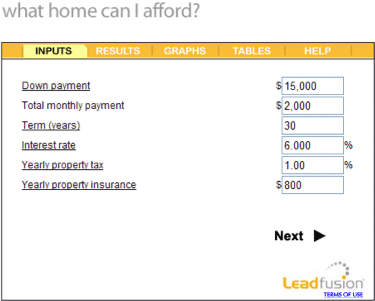Home > Home Buyers Learning Center > Step 1
1. Get Your Finances In Order

A. Check Your Credit
When you apply for a mortgage your lender will verify your credit history. It's wise to check your own credit rating in the beginning of your home search, even if you're sure you have an excellent credit record. There may be blemishes in your credit history that you don't know about. Identifying and resolving credit problems will improve your credit rating and help you obtain more favorable rates from lenders and home insurers. There is no penalty against your credit score for obtaining a consumer copy of your report. Here's how to get a copy of your credit report.
The Fair Credit Reporting Act allows consumers to obtain one free credit report from each of the three major reporting bureaus every 12 months. To obtain your report visit: AnnualCreditReport.com – the only authorized source for consumers to access their annual credit report online for free. You may also call the Annual Credit Report Service at 877-322-8228.
The three major credit bureaus are:
Equifax
www.equifax.com
Information Service Center
P.O. Box 740241
Atlanta, GA 30374-0241
800-685-1111
Experian
www.experian.com
National Consumer
Assistance Center
P.O. Box 949
Allen, TX 75013-0949
888-397-3742
Trans Union Corporation
www.transunion.com
Customer Disclosure Center
P.O. Box 390
Springfield, PA 19064-0390
800-888-4213
The one thing you won't get for free is your credit score. A credit score is a complex mathematical model that evaluates many types of information in a credit file. A credit score is used by lenders to help determine whether a person qualifies for a particular credit card, loan, or service. Most credit scores estimate the risk a company incurs by lending a person money or providing them with a service –– specifically, the likelihood that the person will make payments on time in the next two to three years.

There are several different types of credit scores but the one most commonly used by mortgage lenders is the FICO score. FICO credit scores range between 300 and 850. Generally, the higher the score, the less risk the person represents. The minimum scores required to obtain a home loan vary by lender. You can purchase a credit score when you request your free annual credit report or you can purchase your score directly from any one of the three major credit bureaus.
Now that you have obtained and printed each of your reports it is time to review them. If you find something on your credit report that shouldn't be there you may want to visit the Federal Trade Commission's Facts For Consumers website first to learn about your rights regarding credit repair. Be wary of so called credit repair companies.
What kind of errors are there? Any debts listed that have been paid off but were never updated as paid by the creditor? Any late payments which were not really late? Any credit limit errors indicating you owe more than your high credit balance? Any collection accounts, judgments, charged off accounts with a balance remaining? Are there any debts being listed that were included in a bankruptcy?
Make a list of all of the errors and incorrect information. Make contact with the creditors or collection agents for any unpaid delinquent accounts and get those accounts paid off. Be sure to obtain a "paid in full" letter from those creditors. These will not go away until they are paid. A charged off balance does not mean you no longer owe the money, it means the creditor gave up on collecting from you but may sell the debt to another company to collect on in the future.
For errors, you can begin the process of disputing the items with the three credit bureaus right away. For accounts you need to pay, you will do the dispute once you have a "paid in full letter". Don't rely on the creditors to notify the credit bureaus that the account has been paid. They may or may not follow through and it may take them much longer than it will take you.
You will need to go back to the dispute site for each of the three credit bureaus. Be sure to have your credit reports with you as you will need to enter your report number to access the online dispute processes.
It is very important that you pay all of your debt payments on time going forward. Your credit record is based on your history of paying your debts on time. Paying off a debt doesn't remove its history from your record. You need on time payments going forward to help make up for late payments in the past.
Your credit scores are impacted by your payment history as well as your borrowing profile. For example, if you carry a balance on a credit card that is at or near your high credit limit it will have a negative effect on your credit score. It is better to have balances spread out on multiple cards well below their credit limits than to have all debt on one card at or near its high limit. Opening several accounts recently can also affect your credit. If you accept multiple low interest rate credit card offers and transfer balances from other credit cards to them you may experience a thirty to sixty day period where the old and new accounts are showing your balances and it looks like you have just over extended yourself financially. Be careful not to open too many new accounts at one time.
If you have co-signed on someone else's debt you are still responsible for any late or non-payments. These will affect your credit report and your credit history. When ever you co-sign make sure you have the ability to check to see that payments are being made on time and be prepared to pay them if the primary borrower is not. That is the responsibility you accept when you co-sign. If you have gone through a divorce or separation and have a legal agreement showing the other individual is responsible for the debt it will help you in the mortgage process but won't necessarily protect you from the creditors seeking payment from you. The best thing is to have any joint accounts closed out so that you are no longer affected by delinquent payments.
Repairing your credit can be a frustrating and discouraging process but remember, your credit will not improve until you take the time to dispute and update your own credit files. It is imperative that you stick with it and get your report squared away.
Back to TopB. Figure out how much you can afford to pay each month for your mortgage.
Only you can determine what you feel comfortable with and what you personally want to budget for housing. We define mortgage payment as the total of principal, interest, taxes and insurance (PITI). Insurance is defined as both homeowner's insurance (fire, flood, liability) and mortgage insurance which is required (except on VA loans) when you put less than 20% down on a property. Lenders place two sanity checks on us by using the following rules of thumb for conventional mortgages:
1. Your maximum monthly mortgage payment should not exceed 28 percent of your gross income. Example: If gross household income = $100,000 per year, then your maximum mortgage payment allowed by the lender = $28,000 / 12 or about $2,333 per month. This is known as the front end ratio.
2. Your mortgage payment plus the total amount of your monthly debt payments which include debts like car and student loan payments, child support and the minimum payments made on your credit cards should not exceed 36 percent of your gross income. Example: If gross household income = $100,000 per year, then your maximum allowable monthly debt service is $36,000 / 12 or $3000 per month. This known as the back end ratio. If you have a lot of debt the back end ratio will be the limiting factor in determining how much you can borrow.

When qualifying for FHA and VA loans the ratio analysis is a little different. Your lender can explain the differences for these and other special financing programs they may have to offer. Regardless, the foregoing is a good measuring stick to help when determining a budget for housing. Remember these are maximums set by the lender. You may want to set a lower monthly mortgage payment as your maximum.
Back to TopC. Given your maximum monthly mortgage how much home can you afford?
Whatever payment you decide is your maximum you will want to translate that into a maximum home purchase price. By selecting this mortgage calculator link you will be able to determine the maximum sales price of a home given the following criteria: the maximum monthly amount you want to pay for your mortgage, the amount of your down payment (if any), term of the loan (usually 30 years) and the interest rate you expect to pay on your mortgage. You will need to guesstimate property taxes and homeowner's insurance.
In the example below $2,000 is entered as the maximum desired mortgage payment (PITI), loan term is 30 years at 6 % interest and $15,000 is used for the down payment. For Hampton Roads use 1% as an average yearly property tax figure and $800 as an average yearly property insurance amount. You can tweak these figures as you see fit.

By selecting Next the calculator will compute the maximum purchase price associated with these inputs. It also gives you the loan amount you qualify for which is simply the purchase price minus the down payment. See the results below:

As you can see the amount of home you could purchase in this scenario is $271,836. Because the down payment is less than 20% of the purchase price part of the $2,000 monthly mortgage payment is going towards paying mortgage insurance in the amount of $167 per month.
If the property you are considering purchasing is located within a community that has a condominium or homeowner's association fee or both, these fees will be considered by your lender when determining your maximum mortgage amount.
If you finance your home purchase with a VA loan you pay no mortgage insurance. Please see the Military Mortgage Center section of this website for more information about VA financing.

To figure a maximum purchase price on VA financing enter a fictitious (large) down payment amount so as to eliminate obtaining results with a mortgage insurance payment. The resultant loan amount will also be the maximum purchase price.
Back to TopD. Know how much cash is required to close.
Under the Real Estate Settlement Procedure Act (RESPA), your lender must provide you with a Good Faith Estimate of settlement expenses based upon a given purchase price, down payment and type of mortgage financing. This estimate is presented in a format similar a HUD-1 Settlement Statement. To estimate the amount of cash required at closing, a rule of thumb would be to multiply the purchase price times 3%, then add discount points paid and subtract seller contributions. Settlement expenses are broken down into three categories; Loan Fees, Closing Costs and Prepaid Expenses.
Loan Fees
These fees cover the cost of processing your loan. They vary by state and depend largely on the type of loan program for which you've applied. Occasionally, they include charges by third party companies required to process your loan. Discount points are fees you agree to pay in order to lower your mortgage interest rate. While buying points is sometimes a good decision, many times they cost you more than they save. Consult your agent or lender for specific advice. Listed below are the most common loan fees.
| Common Fees | Based on | Charged by | What it is for |
| Application Fee | Flat Fee | Lender | To process your application. |
| Appraisal Fee | Flat Fee | Third Party | To evaluate the market value of your home. |
| Points Fee | Loan Amount | Lender | To permanently reduce the interest rate over the life of the loan. |
| Courier Fee | Flat Fee | Third Party | To deliver closing documents. |
| Credit Report | Flat Fee | Third Party | To determine how well you have been able to meet your financial obligations in the past. |
| Flood Certification | Flat Fee | Third Party | To determine if your property is located on a flood plain. |
| Document Preparation | Flat Fee | Lender | To prepare the legal mortgage documents for closing. |
| Underwriting Fee | Flat Fee | Lender | To have your loan application reviewed by an underwriter. |
| Tax Service Fee | Flat Fee | Third Party | To set up and administrate your tax escrow account. |
Note: This is a list of commonly applied loan fees. Some of these may not apply to your loan. Contact your loan officer for a list of those costs that apply to you. Your lender may require you to purchase flood insurance as a condition for obtaining a loan. If not, you may still wish to purchase flood insurance. Visit FloodSmart.gov to learn more.
Closing Costs
Closing costs are true costs associated with the purchase of your new home and vary by state. For example, you must select an attorney or title company as your settlement agency. This is someone who will bring together all the documents and monies so that the transfer of ownership can take place. The fee you pay the settlement agency is a cost to close. Listed below are the most common closing fees.
| Common Costs | Based on | Charged by | What it is for |
| Title Insurance | Loan Amount, Property Value, Location |
Title Company | To ensure the seller has a clear title. |
| Survey | Property | Surveyor | To legally delineate the bounds of your property. |
| Attorney | Flat Fee | Attorney | To represent the buyer's interests. |
| Transfer Tax | Varies | State/County | To cover State/County Tax |
| Recording Fees | Varies | County | To record your deed/mortgage in the county records. |
Note: This is a list of commonly applied closing fees. Some of these may not apply to your loan. Contact your loan officer for a list of those costs that apply to you. Not all lenders require that the purchaser obtain - and pay for - a property survey, it is definitely recommended that every purchaser authorize the settlement provider to order a property survey.
Prepaid Expenses (Prepaids)
Prepaids are monies which go toward pre-paying a bill or uses to establish your escrow account. Establishing an escrow account is like priming a pump. You place money in an account at closing which is managed by your lender to pay future property tax and homeowner's insurance bills. Every month you make a mortgage payment, the taxes and insurance (TI) portion of your PITI goes toward building up your escrow account. When these tax and insurance bills come due the lender pays them. In this way, the lender is assured the property is covered in case of fire or other hazards and the taxes get paid. Laws have been enacted and formulas developed to ensure lenders don't place or keep too much of your money in escrow accounts.
| Prepaid Expense | Based on | Charged by | What it is for |
| Real Estate Taxes | 2 month's to 1 year of Lender property tax assessment | Lender | To establish Your Escrow Account |
| Homeowner's Insurance | 2 month's premium | Lender | To establish Your Escrow Account |
| Homeowner's Insurance | 1 year's premium | Insurance Company | To prepay the first year policy premium |
| Mortgage Insurance | 2 month's premium | Lender | To establish Your Escrow Account |
These are standard prepaid expenses and rarely vary between lenders.
For more information check out the US Department of Housing and Urban Development (HUD) booklet entitled, "Buying Your Home, Settlement Costs and Helpful Information".
E. Know how much additional cash you will need.
Family budgeting is beyond the scope of this website but it is worth mentioning that the first year you are in a home you will need money for moving expenses, household setup, appliances, lawn maintenance and just plain old emergencies. In addition, your lender might require you have one or two mortgage payments tucked away in your savings or checking account prior to closing.
When you make an offer to purchase a home the seller will ask for an earnest money deposit. This is money held in escrow normally by a real estate company, the builder or settlement agency and is applied towards your settlement expenses or down payment at closing. Should your loan not be approved, the earnest money will be returned to you. The amount of earnest money varies based upon the price of the home but expect to deposit a minimum of $500 to as much as $5000 or more. Custom home builders and higher end property owners typically request larger earnest money deposits. One to two thousand dollars is the norm.
Congratulations, You Have Graduated to the Next Step >>
Back to Top




